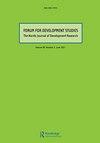Is no One Left Behind? Inclusive Citizenship in Practices of Self-help Groups in Rural Tanzania
IF 1.1
Q3 DEVELOPMENT STUDIES
引用次数: 1
Abstract
Abstract The United Nations’ Sustainable Development Goals (SDGs) are based on the Agenda 2030 according to which ‘no one is left behind’, highlighting the need for inclusive citizenship at all levels. This article examines self-help groups in rural Tanzania as potential arenas for inclusive citizenship, which is defined as bottom-up practices of membership, participation, and livelihood enhancement. However, inclusive citizenship is also characterised by exclusions. Therefore, while acknowledging the important contribution of self-help groups for development, this article scrutinises the question of patterns of exclusion, first, in practices of self-help groups, and second, in the relationships between self-help groups and their wider environments. Based on participant observation, individual interviews, and focus groups discussions in three villages in Mpwapwa District in Tanzania, we found exclusions in the process of establishing groups, while participating in the groups, and in relation to the community and the wider socio-economic system. The findings show how less privileged members of a community are easily excluded from the groups based on criteria related to wealth and perceived trustworthiness, and how the improvements in livelihoods, capacities, and collective action remain local, and do not expand to engagement in wider decision-making nor to addressing the root causes of poverty.没有人掉队吗?坦桑尼亚农村自助团体实践中的包容性公民身份
联合国可持续发展目标(SDGs)以“不让任何人掉队”的2030年议程为基础,强调各级包容公民的必要性。本文考察了坦桑尼亚农村的自助团体作为包容性公民的潜在场所,这被定义为自下而上的成员、参与和改善生计的实践。然而,包容性公民身份也以排斥为特征。因此,在承认自助团体对发展的重要贡献的同时,本文首先在自助团体的实践中,其次在自助团体与其更广泛的环境之间的关系中,仔细研究了排斥模式的问题。根据在坦桑尼亚姆瓦普瓦区的三个村庄进行的参与者观察、个人访谈和焦点小组讨论,我们发现,在建立群体的过程中,在参与群体的过程中,以及在与社区和更广泛的社会经济系统的关系中,都存在排斥现象。调查结果显示,一个社区的弱势成员如何容易根据与财富和感知可信度相关的标准被排除在群体之外,以及生计、能力和集体行动的改善如何仅局限于当地,而没有扩大到参与更广泛的决策,也没有解决贫困的根本原因。
本文章由计算机程序翻译,如有差异,请以英文原文为准。
求助全文
约1分钟内获得全文
求助全文
来源期刊

FORUM FOR DEVELOPMENT STUDIES
DEVELOPMENT STUDIES-
CiteScore
1.80
自引率
14.30%
发文量
24
期刊介绍:
Forum for Development Studies was established in 1974, and soon became the leading Norwegian journal for development research. While this position has been consolidated, Forum has gradually become an international journal, with its main constituency in the Nordic countries. The journal is owned by the Norwegian Institute of International Affairs (NUPI) and the Norwegian Association for Development Research. Forum aims to be a platform for development research broadly defined – including the social sciences, economics, history and law. All articles are double-blind peer-reviewed. In order to maintain the journal as a meeting place for different disciplines, we encourage authors to communicate across disciplinary boundaries. Contributions that limit the use of exclusive terminology and frame the questions explored in ways that are accessible to the whole range of the Journal''s readership will be given priority.
 求助内容:
求助内容: 应助结果提醒方式:
应助结果提醒方式:


